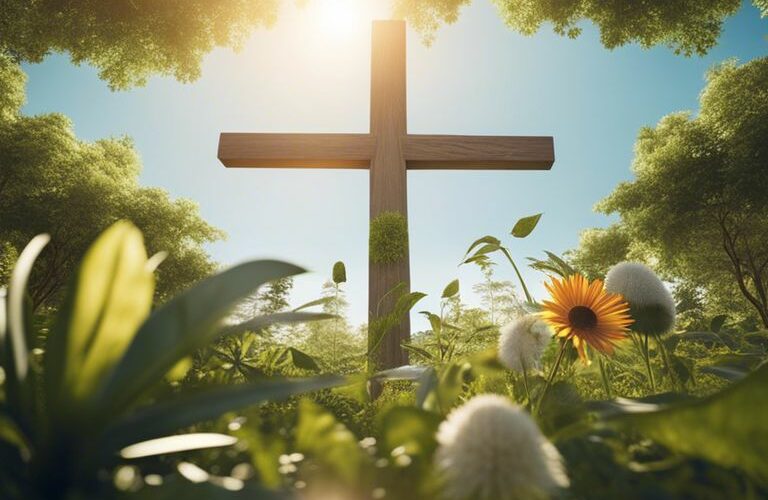In today’s modern world, it has become increasingly vital to understand and appreciate the interconnectedness between ecology and religion. This intricate relationship extends far beyond surface-level observations, delving into the core beliefs and practices of various spiritual traditions that emphasize the importance of living in harmony with the natural world. By exploring the profound connection between these two seemingly distinct entities, we can cultivate a deeper sense of respect and responsibility towards the environment around us.
Table of Contents
Historical Perspectives
The deep connection between ecology and religion can be traced back through centuries of human history. Historical perspectives shed light on how various ancient cultures viewed and interacted with the natural world, paving the way for modern environmental movements.
Sacred Natural Landscapes in Ancient Cultures
With a sense of reverence and awe, many ancient cultures considered certain natural landscapes to be sacred. These places were seen as integral to spiritual practices and were often protected from exploitation. In civilizations like the ancient Greeks, Egyptians, and Native Americans, mountains, rivers, and forests were not merely physical entities but were imbued with divine presence.
Environmental conservation was closely intertwined with religious beliefs, leading to the preservation of sacred natural sites. The harmony between humans and the environment was paramount, with rituals and ceremonies performed to honor and give thanks to the Earth for its abundance.
The Role of Religion in Early Environmental Conservation
Environmental stewardship was a central tenet of many early societies’ religious beliefs. Views on nature were shaped by spiritual teachings that emphasized the interconnectedness of all living beings. Practices such as sustainable agriculture, waste management, and hunting restrictions were guided by religious principles that recognized the importance of maintaining balance in ecosystems.
Perspectives: The integration of religion and environmental ethics in ancient cultures highlights the long-standing tradition of respecting and caring for the natural world.
Transition Towards Modern Environmentalism: A Religious Overview
As societies transitioned towards modernity, the industrial revolution brought about significant changes in how humans interacted with the environment. This shift prompted a reevaluation of traditional religious teachings and their applicability to environmental issues. Many religions began to reinterpret sacred texts in light of contemporary ecological challenges, leading to the emergence of eco-theology and eco-spirituality.
It is crucial to recognize the evolving role of religion in shaping attitudes towards nature and influencing environmental policies and activism. By drawing inspiration from historical perspectives, we can learn valuable lessons on how to achieve a harmonious balance between ecology and religion in the modern world.
Theological Foundations of Ecological Ethics
Obviously, the intersection of ecology and religion is a rich and complex field that has significant implications for how we understand and approach our relationship with the natural world. In exploring the theological foundations of ecological ethics, we delve into the core beliefs and moral principles that shape our attitudes towards nature and guide our actions as caretakers of the Earth.
Christianity and Stewardship of Nature
Foundations of Christian ecological ethics are rooted in the concept of stewardship of nature. The Bible teaches that humans have a responsibility to care for and protect the Earth, as it is a gift from God. This stewardship extends to all living beings and the environment as a whole, emphasizing the interconnectedness of all creation.
Christianity has played a significant role in shaping environmental attitudes and practices throughout history. The idea of stewardship has inspired many Christians to advocate for conservation efforts, sustainable living, and the protection of endangered species. Recognizing the divine essence in nature, Christians are called to be wise and compassionate stewards of the Earth.
Indigenous Beliefs and the Spirituality of the Earth
To indigenous communities around the world, the spirituality of the Earth is at the heart of their belief systems. Nature is not merely a resource to be exploited, but a sacred and interconnected web of life that sustains and nurtures all beings. Indigenous cultures often have intricate cosmologies that emphasize the intrinsic value of the natural world.
Christianity and indigenous belief systems share common ground in their reverence for nature and recognition of the reciprocal relationship between humans and the environment. Both traditions highlight the importance of living in harmony with the Earth, honoring its rhythms and cycles, and cultivating a deep sense of gratitude for the gifts it provides.
Eastern Philosophies: Buddhism, Hinduism, and Taoism on Human-Nature Harmony
Nature holds a central place in the philosophies of Buddhism, Hinduism, and Taoism, which emphasize the interconnectedness of all life forms and the need for humans to live in harmony with the natural world. These traditions view nature not as a mere backdrop to human existence, but as an essential part of the cosmic order that dictates moral behavior and spiritual growth.
Stewardship of the environment is a key principle in Eastern philosophies, focusing on the idea of non-harm and the interconnectedness of all living beings. Practices such as mindfulness, compassion, and minimalism are encouraged to cultivate a deeper connection with nature and promote ecological sustainability. By adopting a holistic approach to life, practitioners of these traditions seek to achieve balance and harmony between humans and the environment.
Islamic Environmental Principles
Principles of Islamic environmental ethics are deeply rooted in the teachings of the Quran and the Hadith, which emphasize the importance of respecting and preserving the natural world as a trust from Allah. Muslims are called to be stewards of the Earth, promoting justice, equity, and sustainability in their interactions with the environment.
HumanNature harmony is a central theme in Islamic environmental principles, highlighting the interconnectedness of humans and the natural world. Islam encourages the conservation of resources, the protection of biodiversity, and the sustainable use of land and water. By following these principles, Muslims strive to maintain a balance between their needs and the needs of future generations, ensuring the well-being of all creation.
Rituals, Celebrations, and Ecology
Despite the seemingly distinct realms of spirituality and ecology, they are intrinsically intertwined through various rituals and celebrations that honor the natural world. These practices serve as a bridge between humans and the environment, fostering a harmonious connection that emphasizes the importance of living in balance with the earth.
Seasonal and Harvest Festivities Across Cultures
Across diverse cultures around the world, seasonal and harvest festivities play a significant role in celebrating the cycles of nature and expressing gratitude for the Earth’s abundance. From the Autumn Equinox celebrations in Pagan traditions to the rice harvest festivals in Asian cultures, these rituals highlight the interconnectedness between humans and the environment.
For instance, the Samhain festival in Celtic traditions marks the end of the harvest season and the beginning of winter. This festival honors deceased ancestors and recognizes the thinning veil between the physical world and the spiritual realm, emphasizing the cyclical nature of life and death.
Water Rituals and Their Significance in Eco-Spirituality
EcoSpirituality emphasizes the sacredness of water and its role in sustaining all life on Earth. Water rituals, found in various indigenous cultures and contemporary spiritual practices, serve as a powerful way to connect with the element of water and acknowledge its vital importance for the planet’s ecosystems.
With water being a symbol of purification, renewal, and unity, these rituals often involve offerings to bodies of water such as rivers, lakes, and oceans. By honoring and respecting water sources, individuals are reminded of their dependence on this precious resource and the need to protect it for future generations.
Ecology in Religious Teachings and Texts
Parables, Psalms, and Passages: Christian Illustrations
After centuries of interpretation and contemplation, Christian teachings have revealed profound insights into our relationship with the environment. Ecology in the Christian tradition is often reflected through parables, Psalms, and passages that emphasize the interconnectedness of all living beings and the sacred nature of the Earth.
These biblical illustrations convey messages of stewardship, respect, and harmony with nature, encouraging believers to appreciate the beauty of creation and to act responsibly towards the environment. For instance, the story of the Good Samaritan teaches the importance of compassion towards all creatures, while Psalms like “The earth is the Lord’s, and everything in it” highlight the divine ownership of the natural world.
Nature in the Qur’an and Hadith: Islamic Insights
Passages in the Qur’an and Hadith offer profound insights on humanity’s relationship with nature in Islam. These sacred texts emphasize the significance of environmental conservation, sustainable living, and the ethical treatment of all beings. The Qur’an portrays nature as a sign of God’s power and mercy, encouraging Muslims to reflect on the beauty and balance of the natural world.
Parables and stories in Islamic tradition, such as the tale of Prophet Muhammad’s respect for nature and animals, serve as powerful reminders of the importance of environmental protection and the interconnectedness of all creation.
The Bhagavad Gita and Vedic Hymns: Hindu Views on Ecology
One of the most revered texts in Hinduism, the Bhagavad Gita, and ancient Vedic hymns offer profound insights into the interconnectedness of all life forms and the sacredness of the natural world. These teachings emphasize the concept of dharma, or duty, towards the environment, promoting a harmonious relationship between humans and nature.
Hymns and verses in Hindu scriptures celebrate the beauty of the Earth, the elements, and all living beings, underscoring the belief in the unity of the universe and the importance of preserving ecological balance for future generations.
Buddhist Stories and Sutras: Enlightenment Through Nature
One of the central themes in Buddhist teachings is the interconnectedness of all beings and the impact of our actions on the environment. Buddhist stories and sutras often illustrate the concept of impermanence and the importance of cultivating compassion and mindfulness towards nature.
One of the key teachings of Buddhism is the principle of non-harm or ahimsa, which extends to all living creatures and the environment. By promoting a deep respect for nature and fostering a sense of interconnectedness, Buddhism encourages followers to strive for enlightenment through their relationship with the natural world.
Indigenous Oral Traditions: Lessons and Warnings
Illustrations from indigenous oral traditions around the world provide valuable insights into the deep connection between culture, spirituality, and the environment. These stories and teachings often carry positive messages about living in harmony with nature, respecting the land, and honoring ancestral wisdom.
Psalms and narratives from indigenous communities also contain dangerous warnings about the consequences of exploiting resources, disrupting ecological balance, and neglecting the sacred relationship between humans and the natural world. By preserving and learning from these oral traditions, we can gain valuable lessons on sustainability and the importance of protecting our planet for future generations.
Religious Movements in Environmental Activism
Faith-Based Initiatives in Conservation Efforts
To understand the significant impact of religious movements in environmental activism, one must delve into the realm of faith-based initiatives in conservation efforts. These initiatives are driven by the belief that caring for the environment is a moral and spiritual obligation. Movements rooted in various religious traditions advocate for the protection of natural resources, biodiversity, and the overall well-being of the planet.
Religious organizations such as churches, temples, and mosques play a crucial role in mobilizing communities to engage in sustainable practices like tree planting, wildlife conservation, and waste reduction. By incorporating ecological values into their teachings and rituals, these faith-based initiatives inspire individuals to become stewards of the Earth and work towards a harmonious balance with nature.
The Role of Religious Leaders in the Climate Change Dialogue
An essential aspect of the intersection between ecology and religion is the role of religious leaders in the climate change dialogue. These influential figures have the power to shape public opinion, advocate for environmental policies, and guide their followers towards sustainable living practices. By speaking out on issues such as carbon emissions, deforestation, and water pollution, religious leaders highlight the urgency of addressing climate change from a moral and ethical standpoint.
Conservation of natural resources, protection of wildlife habitats, sustainable agriculture, eco-friendly practices, climate change, environmental activism, faith-based initiatives.
Green Churches, Temples, and Mosques: Eco-Friendly Places of Worship
Conservation efforts extend to the physical spaces of worship as well, with many churches, temples, and mosques embracing eco-friendly practices to reduce their environmental footprint. These green religious institutions implement energy-efficient technologies, promote recycling and composting, and incorporate sustainable building materials into their structures. By setting an example of environmental stewardship, these places of worship inspire their congregations to adopt eco-friendly habits in their daily lives.
Conservation efforts, eco-friendly practices, sustainable living, environmental stewardship, green technologies, recycling, composting.
Interfaith Environmental Networks and Collaborations
An emerging trend in environmental activism is the formation of interfaith environmental networks and collaborations. These alliances bring together individuals from diverse religious backgrounds to work towards common conservation goals. By fostering dialogue, sharing resources, and organizing joint initiatives, these eco-friendly networks create a powerful force for environmental change that transcends religious boundaries.
EcoFriendly collaborations, interfaith dialogue, conservation goals, environmental change, religious boundaries.
Challenges and Controversies
Not everything about the intersection of ecology and religion is smooth sailing. Challenges and controversies arise that can test the strength of this deep connection.
Doctrinal Disputes and Ecological Misinterpretations
Any attempt to align religious doctrines with ecological principles can lead to disputes and misinterpretations. Some may argue that certain environmental movements clash with established religious teachings, sparking debates within faith communities. For example, interpretations of texts that emphasize human dominion over nature can sometimes be seen as conflicting with the concept of ecological stewardship.
Balancing Development and Conservation: Ethical Dilemmas
An ongoing challenge lies in finding a balance between pursuing economic development and preserving the environment. This ethical dilemma can test the resolve of both religious leaders and environmental activists. On one hand, the need for progress and growth is vital for many communities, while on the other hand, the long-term consequences of unchecked development can be detrimental to the planet.
The Future of Ecological Stewardship in Religion will largely depend on how these ethical dilemmas are addressed and resolved in the coming years.
Denial and Resistance Within Faith Communities
Challenges emerge when certain faith communities deny or resist the idea of integrating ecological stewardship into their beliefs and practices. This resistance can hinder progress towards a harmonious balance between ecology and religion, leading to potential conflicts within and between religious groups.
For instance, some religious communities may struggle to accept scientific evidence supporting environmental concerns, leading to a reluctance to engage in conservation efforts. Overcoming this denial and resistance is crucial for fostering a more sustainable relationship between ecology and religion.
The Future of Ecological Stewardship in Religion
Communities around the world are facing a critical juncture in how they approach ecological stewardship within a religious context. The future will require a concerted effort from faith leaders and followers to embrace and enact practices that prioritize the well-being of the planet. Faith, when combined with a deep reverence for the natural world, has the potential to positively impact the future of our environment.
The Way Forward: Cultivating A Harmonious Balance
Educational Efforts and Curriculum Development
Harmonious integration of ecological principles and spiritual teachings within educational institutions is essential for fostering a deeper understanding of the interconnectedness of all living beings. By incorporating ecology and religion into school curricula, we can cultivate a generation of environmentally conscious individuals who recognize the intrinsic value of nature and the importance of preserving it for future generations. To achieve this, educators must collaborate with religious leaders and environmental experts to develop comprehensive lesson plans that highlight the spiritual significance of our natural world.
Community Engagement and Grassroots Movements
Development of community-based initiatives and grassroots movements plays a crucial role in promoting environmental stewardship and sustainability. By organizing local clean-up events, tree planting programs, and educational workshops, communities can come together to protect their natural environment and inspire others to take action. These initiatives help foster a sense of belonging and empowerment among participants, creating a ripple effect of positive change throughout society.
Any individual, regardless of religious or cultural background, can contribute to these grassroots movements by volunteering their time, resources, or expertise. By building a diverse coalition of environmental advocates, we can leverage collective strength to address pressing environmental issues and create a more sustainable future for all.
Policy Influence and Advocacy: A Multi-Faith Approach
On a larger scale, engaging with policymakers and advocating for environmentally conscious policies from a multi-faith perspective can have a significant impact on sustainability efforts. By forming interfaith alliances and working together to influence legislation, religious communities can amplify their voices and drive meaningful change at the governmental level. This collaborative approach not only promotes eco-friendly policies but also fosters greater understanding and cooperation among diverse religious groups.
Curriculum revision, community engagement, policy advocacy, and personal spirituality are all essential components of cultivating a harmonious balance between ecology and religion. By embracing these strategies and working together towards a common goal, we can create a sustainable future where all beings thrive in harmony with nature.
To wrap up
Exploring the deep connection between ecology and religion has shown us that there is a harmonious balance that can exist between the two. By recognizing and honoring the interdependent relationship between humans, nature, and the divine, we can strive towards a more sustainable and interconnected way of living on this planet. Through the teachings and practices of various religious traditions, we are reminded of our responsibility to care for the Earth and all of its inhabitants, fostering a sense of reverence and stewardship for the environment.
As we continue to navigate the environmental challenges facing our world today, it is essential to draw upon the wisdom and insights offered by religious teachings to guide us towards a more balanced and harmonious relationship with nature. By integrating ecological consciousness with spiritual beliefs, we can work towards creating a more sustainable future for generations to come. Let us embrace the unity of ecology and religion as we strive to live in harmony with the Earth and all of creation.

Our contributing author is a passionate advocate for eco-friendly living and sustainability. With a background in eco-life, they are dedicated to inspiring and empowering individuals to adopt environmentally conscious lifestyles. Through insightful articles, they share practical tips, innovative solutions, and thought-provoking perspectives to promote a greener, more sustainable world. Join them on the journey towards eco-smart living and discover how small choices can make a big impact. 🌱









